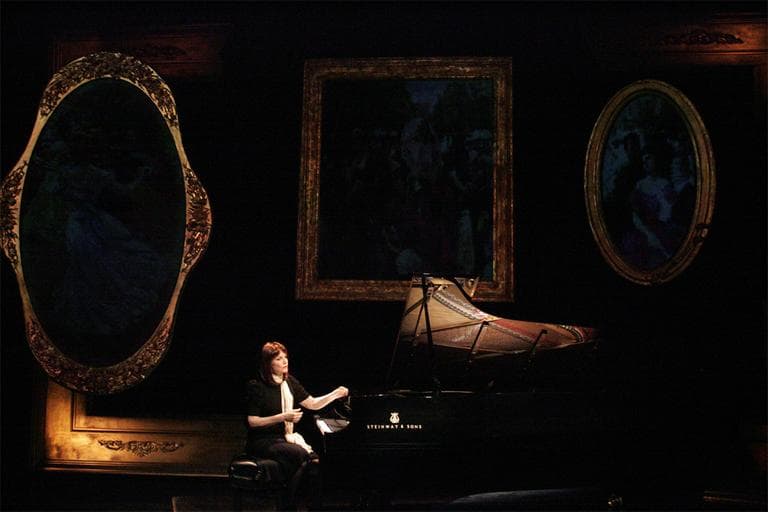Advertisement
'Pianist Of Willesden Lane' Tells Heroic WWII Story
Resume
In the months leading up to World War II, the Kindertransport rescue movement helped get about 10,000 Jewish children out of Nazi-occupied countries to safety in Great Britain. Their parents did not come with them. Lisa Jura was one of those children.
Lisa Jura was a piano prodigy, but when her mother and father sent her on the Kindertransport system of trains and ferries from Vienna to London, it looked like her music career may be over.
Jura's story is being told by her daughter, Mona Golabek, in a one-woman performance called "The Pianist of Willesden Lane," now showing at ArtsEmerson. Golabek spoke with WBUR's All Things Considered host Sacha Pfeiffer about her mother's amazing journey.
Sacha Pfeiffer: This performance began as a book you wrote called "The Children of Willesden Lane" and now it's a staged production where you're telling the story while playing the piano, and here I should note that you are a concert pianist. What made you think of turning your book into a musical work?
Mona Golabek: I dreamed about taking the book and turning it into a theatrical production because I saw the effect of my telling the story to students when the book first came out. When I'd go out on the stage and play some of the music that my mother loved and was part of her journey, I saw that suddenly Beethoven's Moonlight Sonata or the Claire de Lune of Debussy was felt by these young people in a whole different light. Because my mother always told me when she was teaching me the piano, 'Every piece of music tells a story, but you have to discover what that story is.' I felt that if I had the opportunity to go out on stage and share this heroic story, I believe, of an incredible country — British Christians coming together with British Jews, a clarion call going out on the BBC Radio to save the lives of these children, where the trains went to the west instead of the east to the camps — that I would have an opportunity to inspire many thousands of people.
I saw your show last weekend and I can still hear that piece of music that was meant to represent your mother sewing in a manufacturing plant, which is the job she was given when she got to London. The music is lively and busy, just like you'd imagine a row of sewing machines being. What was that process like — trying to find music that would match the scenes you were describing?
It was very natural, because as you listen to the excitement of this Gigue [jig, a fast dance] from the Partita, you feel the sewing machine, and my mother would always tell me that while she was in these factories doing these jobs she had a very active imagination, so she would be thinking of the princess, that she had just seen Buckingham Palace, and she knew she was the same age as Queen Elizabeth — Princess Elizabeth, of course, at that time. And so she would go off into her imagination. She would always tell me how each piece of music tells a story, and that's what saved her life.
I was astounded, truly, by your ability to play these complicated pieces of music, not only while not looking at the keys but while looking at the audience and telling the story. Was that difficult, or is it as easy as you made it look?
I worked on it, but my mother was a storyteller, and I became a storyteller. So in the growing-up years, as I was concertizing, I would often go out to audiences and talk to them. This, though, was something quite challenging, because I was really doing it in theatrical form, but now it feels very natural when I go out on stage.
There's a scene in your show where your mother describes a dream she has about performing in a Vienna concert hall, and for a while it's not clear whether your mother will ever play the piano again after she leaves Vienna. But that is a happy part of the story — the happy outcome.
Absolutely. She told me that every Friday, when she would go to her piano lessons on the trolley in Vienna, of Mahler, Beethoven, Schubert, the streets and the marble speaking that music to her, a young girl, [age] 12, 11, 13, dreaming of performing at the Musikverein — and then cut short.
But she did eventually become an accomplished concert pianist?
Yes, she held on to the dream. Of course, I don't want to give it away to all of your listeners. I'm hoping they'll come to ArtsEmerson. I'm hoping they'll come to see how a young girl held on to her music.
Is your mother still alive?
No. I lost my mother a few years before the book was published. But I have to believe that somewhere she has heard the words of thousands of students across America — we have many letters in our office, letters that keep me going and that I cherish, such as Amanda from Kansas who wrote and said, "Lisa Jura reminds me that I can hold on to something in the darkest of times and make something of my life, and I will do that."
This program aired on December 5, 2012.